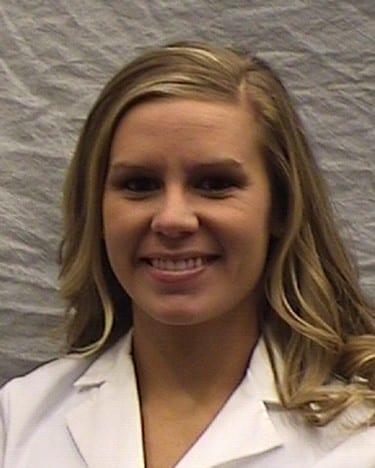
Jayna Hoover, D.P.T.’15, hopes to eventually return to rural Kossuth County, IA, where she grew up. “The area has predominantly male physical therapists. Last winter, I began contemplating, ‘What can I bring to the area?’”
She wasn’t thinking about just her gender. She’s gaining knowledge and skills in pelvic floor physical therapy to treat women with urinary incontinence and pelvic pain.
“These are conditions that patients are hesitant to discuss with their physicians or therapists,” she says. “As a therapist, you have to be open-minded and skilled in helping those patients. I wanted to get that additional specialty training.”
Hoover began doing so with a scholarship provided by the DMU physical therapy department that enabled her to participate last July in a three-day, on-campus continuing medical education course offered by the American Physical Therapy Association. The course is the first prerequisite in a series of three courses designed to give practicing clinicians a comprehensive knowledge base in physical therapy evaluation and treatment of pelvic floor dysfunctions.
This spring, she will complete an internship in the DMU Physical Therapy Clinic with Libby Trausch, D.P.T.’08, who holds certification in pelvic floor physical therapy from the American Physical Therapy Association. “After five years of growing our clinical practice in pelvic physical therapy, we’re very excited to begin training students in this extremely rewarding niche practice area,” Trausch says. “Many people with problems ‘down there’ are so relieved to finally find help for their problems, and our patients travel hours to find someone who specializes in this area. To train someone planning to practice in rural Iowa is so important.”
That training will only become more important: DMU PT Clinic Manager Kari Smith, M.S.P.T.’98, D.P.T.’04, ATC, BCB-PMD, points to research by Jennifer Wu, M.D., M.P.H., et.al. published in Obstetrics and Gynecology in 2009 that estimated the epidemiology of urinary and fecal incontinence and pelvic organ prolapse will increase from 28.1 million people to 43.8 million from 2010 to 2050. The DMU Physical Therapy Clinic is prepared to meet the health care needs of the community with three physical therapists — Smith, Trausch and Kathryn Cardamon, M.P.T. — who have specialty training in pelvic floor dysfunction.
Hoover’s experience is an example of how DMU’s continuing medical education program can provide students additional training and how the clinic can then offer additional specialty rotations because of that training. It’s also an opportunity for students to enhance their marketability among future patients.
“A lot of that will involve making connections with physicians in the area. I also hope to practice in a small town, where word travels fast,” she adds.

